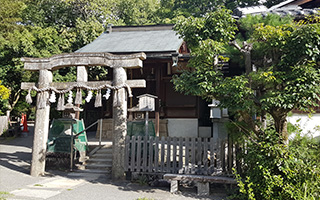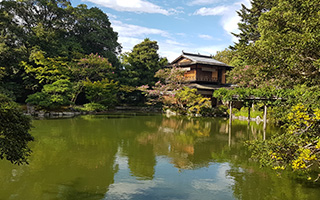International Training Course (ITC) on Disaster Risk Management of Cultural Heritage 2022, 16th year, Ritsumeikan University in collaboration with ICCROM
Dates
18th of August to 13th of October 2022
(Two online sessions of 150 minutes each will be held on Mondays and Thursdays, and one mentoring session on Fridays of every week for 8 weeks)
Time: 8:30-11:00 (CET/Summer), 15:30-18:00 (JST)
Background and Objectives of the Course
The International Training Course on Disaster Risk Management of Cultural Heritage is a follow-up of the recommendations adopted at the Special Thematic Session on Risk Management for Cultural Heritage held at UN-WCDR (World Conference on Disaster Reduction) in January 2005 in Kobe, Hyogo, Japan. One of these recommendations advocated the need for the academic community to develop scientific research, education and training programs incorporating cultural heritage, in both its tangible and intangible manifestations, into disaster risk management. The importance of strengthening knowledge, innovation and education to build a culture of disaster prevention at WH properties was reiterated by the World Heritage Committee at its 30th session (Vilnius, Lithuania, July 2006). Till now, 165 professionals from 68 countries have been trained through this annual course.
The main objective of the course is to provide theoretical and practical knowledge on the various aspects of disaster risk management of cultural heritage.
Please refer to the following link: ITC Core Programme page.
Subtheme of ITC 2022
Traditional knowledge for disaster risk management of cultural heritage
Through living in hazard-prone areas and experiencing frequent natural hazards, local communities and indigenous peoples have developed traditional knowledge related to disasters in their localities. This includes knowledge of the components of disaster risk, though most often in their own language and with definitions in the context of their respective cultures as well as local ways of risk reduction, preparedness, response, and recovery. It also includes crucial aspects such as the role of local formal and informal governance structures, kinship and other social networks, and various cultural aspects.
Traditional knowledge has allowed communities to thrive and build capacity in challenging physical landscapes and multi-hazardous environments, as well as in various socio-economic, political, and cultural contexts. It is apparent that traditional knowledge is a critical component of how communities across the globe reduce and manage disaster risks in their respective localities. However, and more recently, there is an increased interest in utilising principles behind this type of knowledge in wider disaster risk reduction policies and practice, beyond communities themselves. Moreover, traditional knowledge has the huge possibility of utilizing the learnings on disaster risk reduction gained through trials and errors over time, for disaster risk management in the current context. The 2015 Sendai Framework of Disaster Risk Reduction underlines the importance of addressing the needs and the role of traditional knowledge in tackling disaster risks.
This year, ITC will focus on the role of traditional knowledge in disaster risk management. Japan is home to a variety of frequently occurring disasters, which can cause wide-ranging damage to its cultural resources. This has resulted in the development of a rich wealth of traditional knowledge that can contribute towards disaster risk management. Various organizations have taken specialized measures which are based on traditional knowledge for mitigation, preparedness, emergency response, and post-disaster recovery of cultural heritage. These measures, developed in response to local geographical, climatic, and social characteristics related to the Japanese context as well as from other parts of the world will be introduced to the participants during this interdisciplinary training.
Methodology
1) The course will be conducted over 8 weeks. Each week there will be two online sessions and one mentoring session. The first online session of each week will be an interactive online session conducted by resource persons whose lecture videos will be provided to participants beforehand. The second online session of each week will be an online workshop on the subject covered in the previous session. The mentoring session of each week will be the time to consult participant’s individual case study projects with our resource persons.
2) Virtual site visit videos on relevant topics will be shared with the participants during the course.
3) Besides the formal sessions, there will be opportunities for informal discussions with ITC team members to talk about their case study projects and prepare for the final presentation by the participant.
4) Participants will select one cultural heritage site or institution from their respective countries and will develop disaster risk management plans during the course, which will be presented during the final presentation.
5) Our resource persons, made up of internationally recognized experts in their respective fields, will evaluate these plans.
Participants
The participants will be made up of a maximum of 15 professionals from all parts of the world, working in the fields of cultural heritage conservation and disaster risk management.
Working Language
English
What Participants Receive after Successful Completion of the Course?
- Course completion certificate
- Paper based on the DRM plan of Case Study Project prepared during the course will be published in the proceedings of ITC 2022
- Posters based on DRM plans of case study projects prepared during the course will be uploaded on the website of R-DMUCH and ICCROM
Application Requirements
ITC 2022 Guideline for Application (PDF)
ITC 2022 Application Form (Word File)
Application Deadline
April 4 Monday, 2022 (JST) ※Please submit your application form in a word file.


